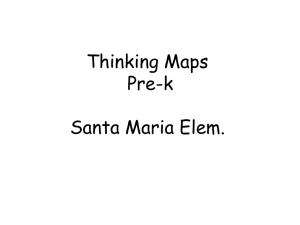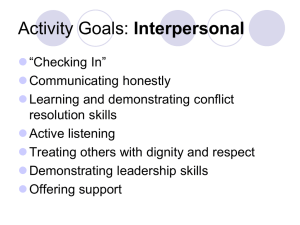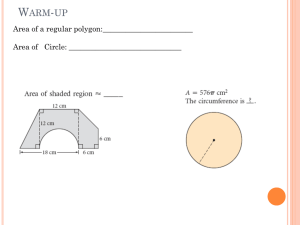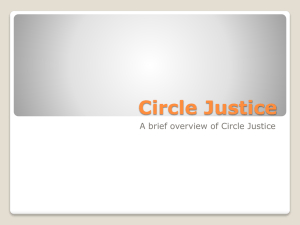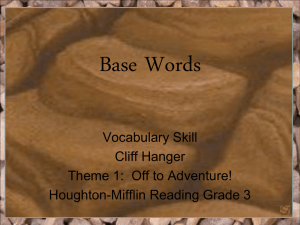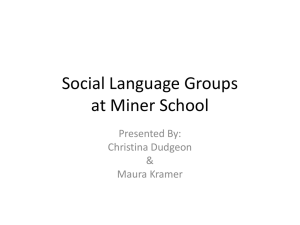The Helping Puzzle - John Peters
advertisement
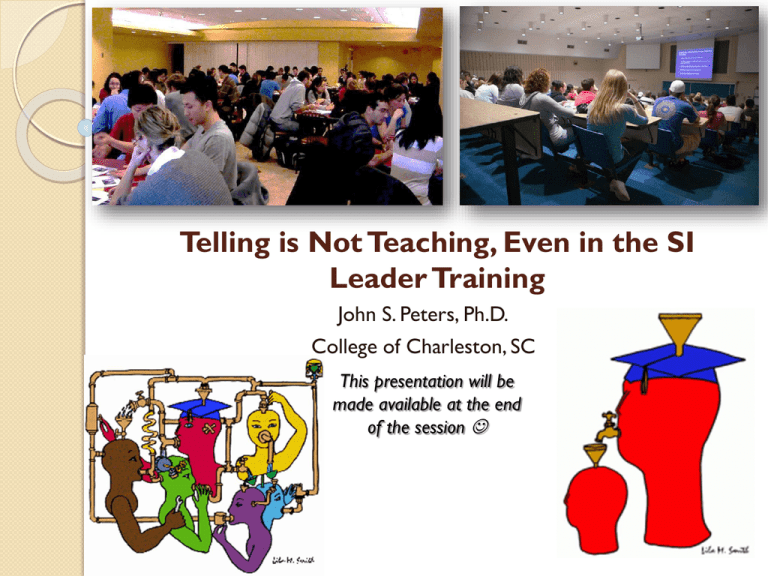
Telling is Not Teaching, Even in the SI Leader Training John S. Peters, Ph.D. College of Charleston, SC This presentation will be made available at the end of the session To do for this session! Sit in groups of 3-4 Get out a sheet of notebook paper. If you have a cell phone or tablet with internet access please get it out. • WiFi password is umkc514 for Westin Meeting Rooms • Cell phones should be in silent mode. How can we help our SI Leaders to overcome their reticence to facilitate group work? understand and internalize the benefits of collaborative learning? facilitate effective group learning sessions? avoid “lecturing” during SI sessions? The Helping Puzzle Helping Puzzle Picture #1 – Lecture 1. The picture is a large circle whose diameter is approximately ½ the width of a standard notebook page and centered on a page oriented in landscape. 2. There are 4 rectangles at the north, south, east and west points of the circle that protrude outward from the circle. The longer side of each rectangle is one-fourth the diameter of the circle. The shorter side is ½ the length of the longer side & it is the shorter side of each rectangle that is tangent to the circle. 3. Inside the circle is an isosceles triangle. The bottom two points of the triangle intersect with the larger circle at points that are about 1/2 the distance from the west to south rectangles, and east to south rectangles respectively. The top of the triangle protrudes out of the larger circle and forms a small triangle inside the north rectangle. 4. Inside the triangle there are three overlapping circles that form a triangular shaped Venn diagram. Each circle in the Venn diagram has a diameter that is approximately 1/3 the diameter of the outer circle, and has two points that are tangent to the outer triangle. The center of the Venn diagram is the center of the larger outer circle. Puzzle #1 • Large circle whose diameter is approximately ½ the width of a standard notebook page. • 4 rectangles at the north, south, east and west points of the circle. • Rectangles protrude outward from the circle. • Width of the longer side is ¼ the diameter of the circle & the shorter side is ½ the length of the longer side. • Shorter side of each rectangle is tangent to the circle. • Inside the circle is an isosceles triangle. • Bottom two points of the triangle intersect with the larger circle at points ~1/2 the distance from the west to south rectangles, and east to south outer rectangles respectively. • Top of triangle protrudes out of the larger circle and forms a small triangle inside the north rectangle. • Inside the triangle are three overlapping circles of equal diameter forming a Venn diagram. • Venn diagram circles = ~1/3 diameter of outer circle, and each has two points that are tangent to the outer triangle. • Center of the Venn diagram is the center of the outer circle. On a scale of 1-4 rate how confident are you that the puzzle picture you drew is correct? 1= not at all confident 2= only a little confident 3= confident 4= very confident Puzzle #2 • There are three diamonds of equal size lined up side by side across the center of a notebook page oriented landscape. The middle diamond is in the exact center of the page, and its east and west points touch the corresponding points of each adjacent diamond. The total width of the three diamonds is about three-fifths the width of the page. • Below the three diamonds are two circles whose diameters are equal to the length of one side of one of the diamonds. The two circles are tucked up inside the two partial triangles that form from the meeting of the three diamonds. Each of these two circles is almost, but not quite, tangent to the lines forming the bottom of the diamonds above. Inside each of these two circles are equilateral triangles, whose points intersect with north, southeast and southwest points of the respective circle. • A third circle, of equal diameter to the former circles, overlaps the middle diamond and the peak of the middle diamond is at the center of this circle. A vertical line runs down the diameter of this circle so that a “peace sign” is formed from the circle, the top of the diamond and the circle’s vertical line. On a scale of 1-4 rate how confident are you that the puzzle picture your TEAM drew is correct? 1= not at all confident 2= only a little confident 3= confident 4= very confident Give yourself a grade… 1. 2. 3. 4. 5. Not even close! Pretty bad…lots of differences Not too bad…just a couple of differences Pretty darn close! Looks exactly like this one. Give yourself a grade… 1. 2. 3. 4. 5. Not even close! Pretty bad…lots of differences Not too bad…just a couple of differences Pretty darn close! Looks exactly like this one. Why did both confidence and performance increase on the team drawing? Think, Team, Share How did I structure the team session to insure that individuals could reveal their thinking in personally non-threating ways? teams worked together and share ideas. teams were motivated to think “deeply” about the task, and produced a high-quality product? individual’s misconceptions were revealed & corrected Think, Team, Share What do these results reveal to us about how you, as an SI Leader, can best help students learn difficult course material?


